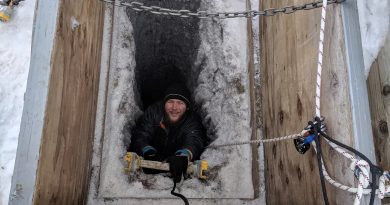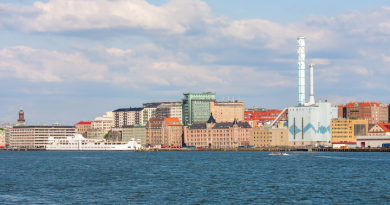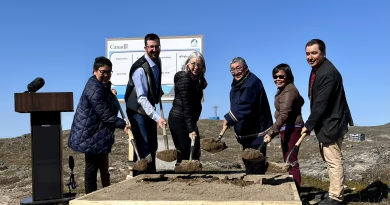More than 150 Alaskan villages excluded from jury duty, can residents get fair trial?
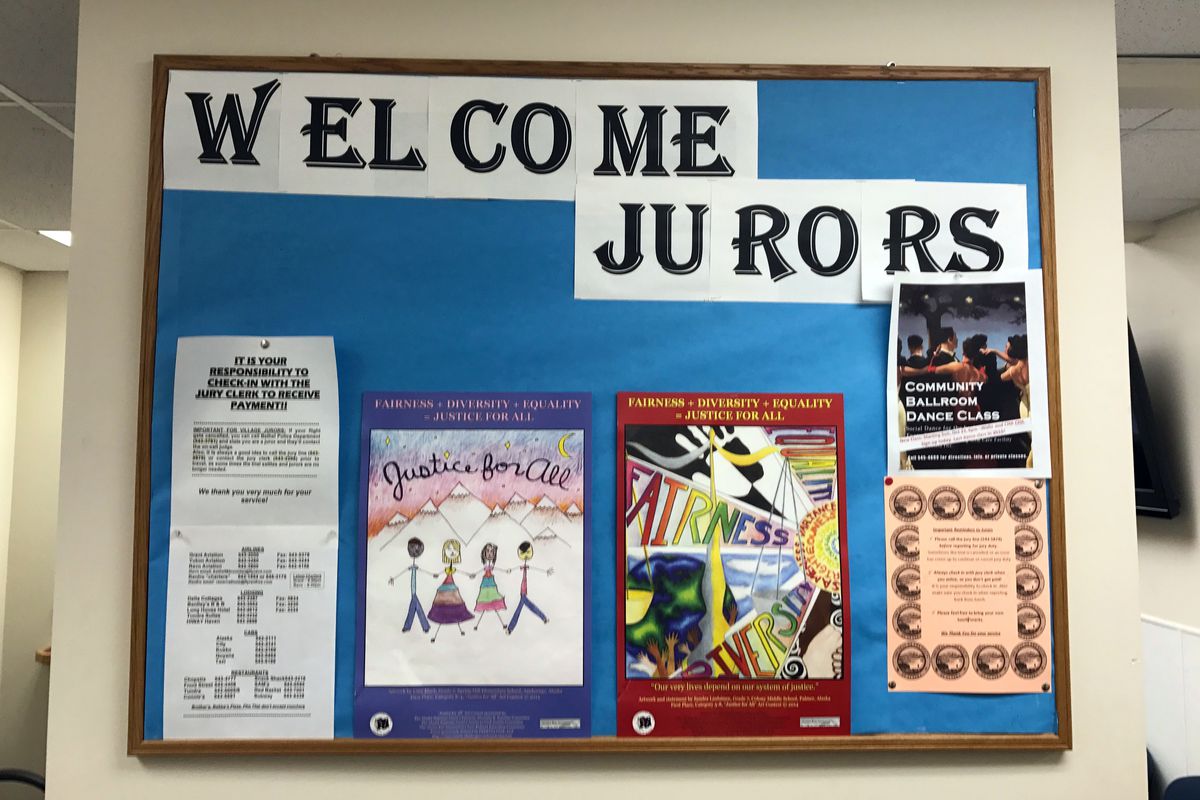
BETHEL — In remote villages all over Alaska, no one ever gets called for state jury duty. To save money, Alaska intentionally excludes people from trials in more than 150 communities, some on the road system but most not: Ambler and Anaktuvuk Pass, Cantwell and Chevak, Whittier and Willow.
The state says it’s saving money, but advocates say the practice results in blacklisting of communities and jury members who are not cultural or racial peers of some defendants. The system is now being challenged by a village resident who says that, in a hallucination brought on by “hysteria,” he shot two strangers who he believed could have been mythical tundra creatures.
The defendant, Teddy Smith of Kiana, contends the omission of village residents from the jury that convicted him of injuring two hunters violated his basic constitutional right to a fair trial and deprived residents of their right to be part of the judicial system.
Most of those never called to serve are Alaska Native, according to Smith’s filing with the Alaska Court of Appeals. The never-called communities — generally at least 50 miles from a courthouse — also are much poorer than those that participate in jury service, according to the analysis by Smith’s lawyer.
While the case itself is an appeal of a criminal conviction, the ACLU and others hope to use it to change Alaska’s system of jury selection and end what they call disenfranchisement of Native people from a key part of the judicial system.
“Serving on juries is a right that is akin to voting,” said Erin Dougherty Lynch, an Anchorage-based attorney with the Native American Rights Fund, a nonprofit legal firm that joined with the ACLU to file a “friend of the court” brief supporting the appeal. “Any time we see a figure like 30 percent of the Alaska Native population is kept exempt from this essential benefit that one gets as a citizen, that makes us take notice.”
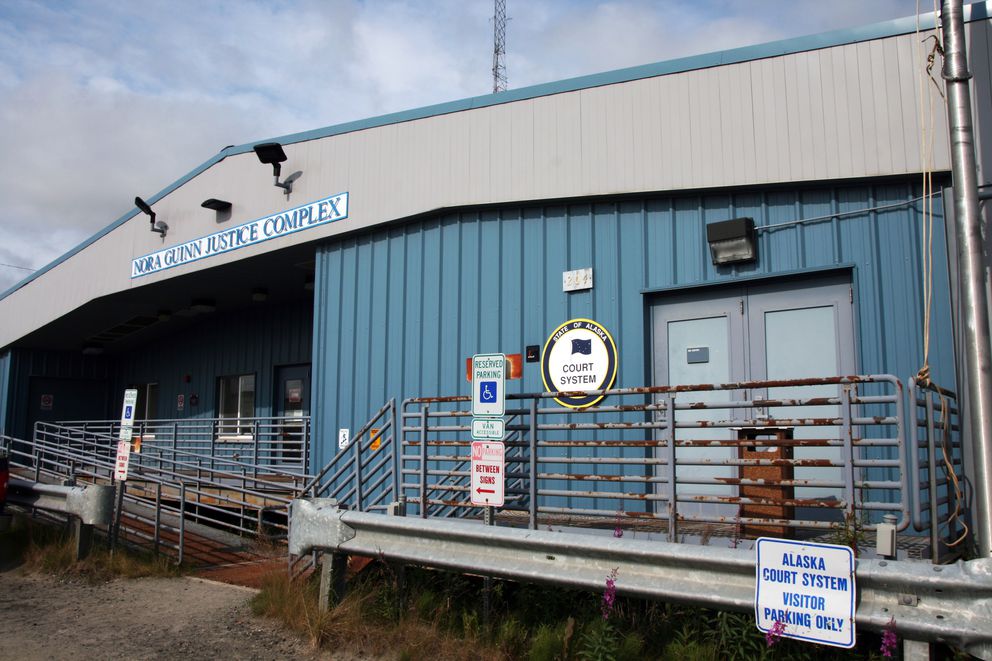
Almost one in four Alaska Native people live in communities that don’t provide jury members and nearly 10 percent more are allowed to serve only in misdemeanor cases tried in smaller courts, according to the appeal.
Court administrators say the cost of bringing in far-flung jurors would be significant. At any rate, it hasn’t been established that jury service is a fundamental right, said Doug Wooliver, deputy administrator of the Alaska Court System.
John Skidmore, director of the state Department of Law’s criminal division, said a response is still being worked on and the department wouldn’t comment at this time. The court system is preparing its own official response as well, with a private lawyer. The judicial branch of government runs the jury system.
Those challenging the practice say high costs shouldn’t override what they see as rights inherent in the jury system: to a fair trial, due process and equal treatment no matter where a person lives.
The exclusion just further alienates village residents from an intimidating, urban-centered criminal justice system, advocates say.
The practice, authorized under an Alaska Supreme Court administrative rule, has been documented as a problem for decades by reviews from inside and outside the court system. Yet, with some 25,000 Alaska adults kept from juries, Smith’s side says nothing much has changed.
“No wonder people in the communities don’t feel connected to the justice system or don’t think that it works for them,” Lynch said. “They don’t participate in it at all.”
‘What was real’
The troubles for Smith erupted after his mother died in September 2012 in their home village of Kiana. Health aides and others were in and around the home when Smith fired a shotgun toward the house — and the people.
No one was hurt then, but Smith took off that night and spent the next week to 10 days hiking, camping and living on berries and water, according to his appeal.
He ended up exhausted, hungry and delirious at a cabin on the Squirrel River, north of Kiana. Two brothers on a hunting trip ended up there too. Smith was friendly at first but then his mental state turned. On his long hiking days, he had been seeing “inukuns,” troublesome creatures of the tundra, Smith, who is Inupiat, later told jurors, according to a recap in his appeal. He thought they were following him day and night, maybe trying to lead him somewhere.
When brothers Paul and Charles Buckel arrived at the cabin, at first Smith thought they might be people rather than the mythical inukuns.
Then the voices came back, he told jurors of his thought.
The brothers “were part of … the voices and everything that was following me, or leading me up to that cabin,” he said.
He shot Charles and thought that Paul was going to lunge at him, so he shot him too, the criminal appeal says. Both men survived, though Paul says he still feels tingling and sensitivity on his injured arm, according to the appeal.
Jury of Kotzebue residents
Smith stole the brothers’ raft to get away, troopers said at the time. He wanted to return to his home village of Kiana “to know the truth, to find out what — what was real, what isn’t,” according to the appeal.
Troopers swarmed the river from the air and water and arrested Smith. He was charged with first-degree attempted murder, robbery, assault and theft, along with weapons charges that were later dismissed.
His trial took place in November 2014 in the hub town of Kotzebue.
A jury made up solely of Kotzebue residents convicted Smith, now 50, of multiple felonies including first-degree attempted murder.
No one from his community of Kiana, 59 miles away, was called for jury duty, nor was anyone from the other 10 villages assigned to the Kotzebue court.
Smith was sentenced to 99 years.
The power of jurors
Some Alaska courts draw in residents from outlying villages for jury duty and others do not, Smith’s lawyer, Kelly Taylor, wrote in the appeal. She declined to be interviewed.
People in excluded communities come to court only as defendants, victims or witnesses, and are cut off from the opportunity to help shape the application of law as jurors, the Native American Rights Fund points out.
Almost all villages around Nome and Utqiaġvik are cut off as well as those around Kotzebue. So are villages in the Aleutian chain except for Unalaska. In Interior, Southeast and Southwest Alaska, it’s a mix.
Jury service is an important way for individuals to participate in the democratic process, Taylor wrote in the appeal.
“Indeed, for those who actually serve as jurors in criminal trials, their votes as jurors have even more power than their votes at the ballot box: In a criminal trial, because the verdict must be unanimous, every juror’s vote contributes equally and is necessary to the outcome,” the appeal brief said.
The presiding judge in each of Alaska’s four judicial districts issues an annual order that specifies which communities are in and which are out.
Residents of communities at least 50 miles from a court generally are excluded, under the Alaska Supreme Court rule. So are some closer communities, based on the cost. In some communities — notably Bethel — residents are called so often it’s a burden. In others, they never will find a summons notice in their mailbox.
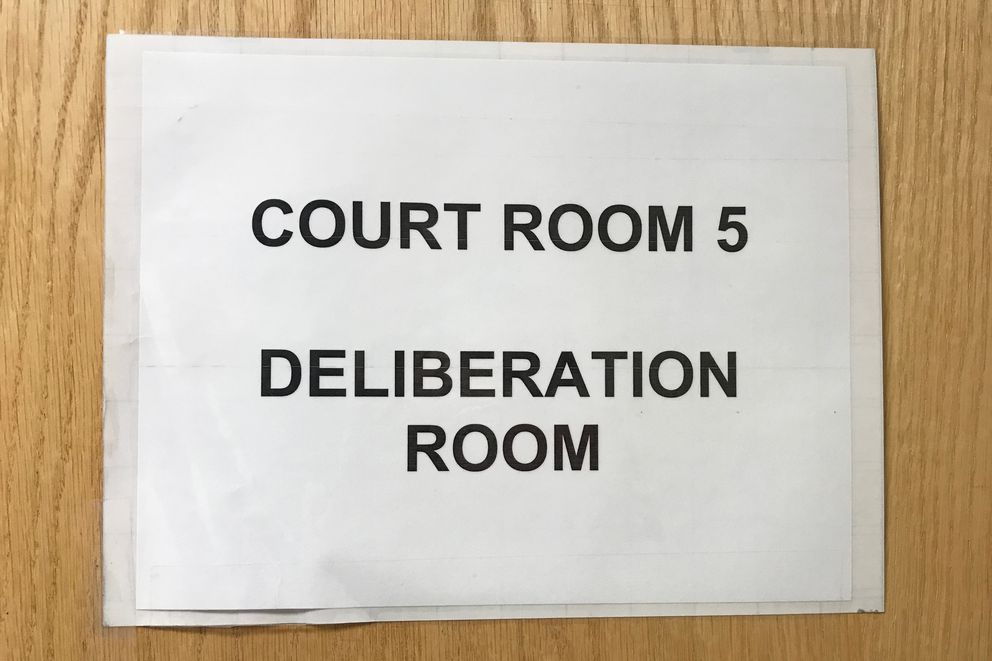
In the 3rd Judicial District, which includes Anchorage, the radius is just 30 miles for trial jurors but 50 miles for grand jurors. Willow residents, for instance, can land on a grand jury but not on a trial jury.
Yet, in the same district, Dillingham draws from a bigger area, bringing in jurors from eight surrounding villages including Togiak, 68 miles away.
Around the Yukon-Kuskokwim Delta in Southwest Alaska, residents of a dozen villages, from Eek at the mouth of the Kuskokwim River to Tuluksak upriver, are summoned for duty in Bethel’s busy trial courts. But many more are never called, an issue that brought the Bethel-based Association of Village Council Presidents into the Smith appeal.
The entire Kusilvak Census Area — the equivalent of a county in most states — is excluded from jury service, including three neighboring Delta villages with about 2,500 residents altogether: Hooper Bay, Chevak and Scammon Bay, said Liz Pederson, a former public defender who is now chief operating officer for AVCP, the regional Alaska Native nonprofit corporation.
“You could easily pick a 12-person jury from that,” Pederson said.
Hooper Bay has a courthouse, but no trials happen there because there’s no lodging, restaurants or ground transportation from the airstrip to court, said Wooliver, the deputy administrator of the Alaska Court System.
Village culture and routine vary even within a region, Pederson said. It’s hard to explain to a juror the particulars of hauled water, subsistence, gun customs and all the rest that differ place to place, she said.
Tribes now are trying to establish their own courts but are struggling to get their communities to respect their authority and role, perhaps because it is all so distant, she said.
For generations, she said, communities have been deprived.
Blacklisted Alaska communities
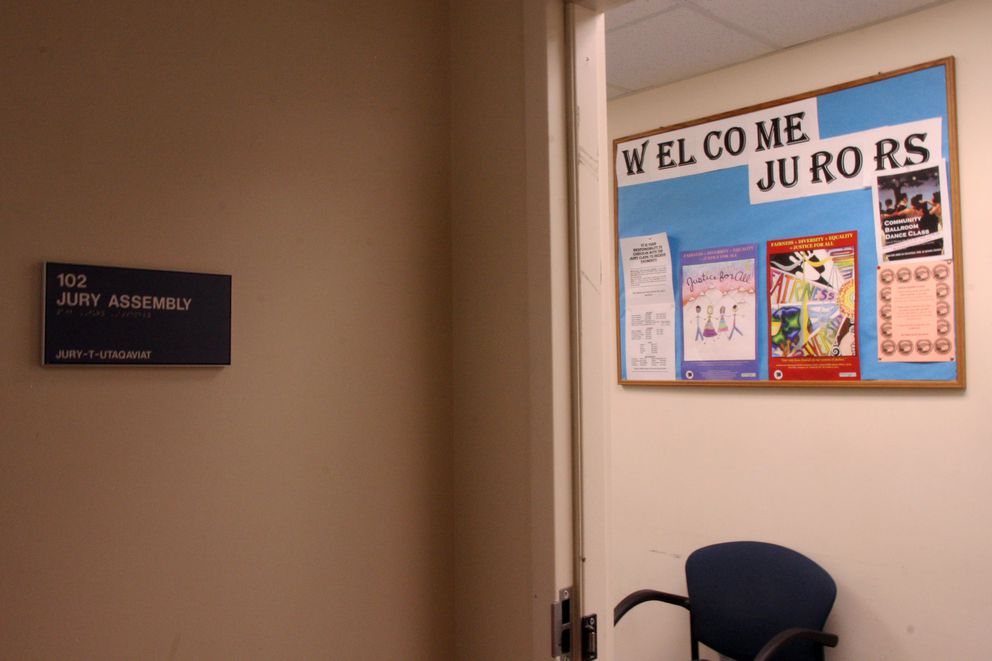
Other reviews have found the same thing.
Concern over jury travel costs “has resulted in effective blacklisting of many Alaska communities and their citizens from participation in the jury process,” said a 1995 report by the Alaska Public Interest Research Group cited by AVCP and its lawyers, the American Civil Liberties Union of Alaska Foundation and the Native American Rights Fund.
Far-away courts and exclusion from juries contribute to feelings of isolation and distrust of the criminal justice system, the Alaska Supreme Court Advisory Committee on Fairness and Access concluded in 1997 after spending 20 months investigating various inequities.
“Many state residents see the court system as a remote, intimidating and unfathomable institution,” the committee said. The full committee urged that presiding judges figure out how to include as many residents as possible for jury duty.
Ten years later, a follow-up review found no real improvement.
The last big court ruling on jury service in Alaska came in 1971. The Alaska Supreme Court ordered a new trial for an Alaska Native man convicted by an Anchorage jury of a crime in rural Chignik, according to the Citizen’s Guide to the Alaska Constitution. Anchorage’s urban culture was just too different from village life, the justices ruled in the case brought by Cloyd Alvarado.
Jury structure was even more restricted then. Anchorage jurors only came from a 15-mile radius.
“When a large segment of the population lives in towns and villages scattered throughout the reaches of the state, we cannot afford to succumb to the temptation of convenience by allowing the machinery of justice to become inflexibly entrenched within the enclaves of our major cities,” the Supreme Court ruled.
Only jurors from Kotzebue
Nowhere is the issue more visible than in Kotzebue. Only residents from Kotzebue can be summoned for trial duty there, under the presiding judge’s current order, which is similar to those before it, says the appeal. Two villages within the 50-mile range, Noatak and Noorvik, are excluded, the order says.
Smith’s trial defense lawyer had pushed for a jury that included village residents, arguing that certain aspects of the case would best be understood by them.
People who depend on subsistence, for instance, might be more open to a defense argument that Smith had the opportunity to kill the brothers, and chose not to do so. That goes to whether he had the intent to kill, the defense said. Village jurors might better understand that his story about the inukuns was one deeply ingrained in the culture, not crazy talk or a diversion, the defense said.
Then-Superior Court Judge Timothy Dooley initially ruled that Noatak and Noorvik should be included, since they are within the 50-mile boundary. Then the state jury coordinator submitted a 1986 order stating that including those communities would be “extremely expensive.” Dooley narrowed the jury pool to people in Kotzebue.
Feds bring in everyone
Compare the state’s approach to the federal system, in which residents of every community in Alaska can be called for jury service.
“I’ve got someone from Sand Point right now. And someone from Atka,” said Jerri Willcox, federal jury administrator for Alaska, referencing the tiny community on the Aleutian chain and Sand Point, where the Alaska Peninsula meets the Aleutians. “So yes, every community in the state is represented.”
It is both a right of citizenship and a duty, Willcox said.
Rural residents often appreciate a government-paid trip to Anchorage, Fairbanks or Juneau, the three main places for federal trials in Alaska, she said. Still, she noted that federal courts, with just 12 to 15 trials a year, aren’t nearly as busy as state courts, where hundreds of cases go to trial each year.
“It’s still jury service, but they have their own rules and I have mine,” Willcox said.
Usually, state courts hear complaints from people trying to get out of jury duty, not those eager to serve who were barred, said Wooliver of the court system. Service can be disruptive to jobs and family routines.
“You know how jury duty works too. Some people just can’t wait to be on a jury but most people prefer not,” he said.
He doesn’t believe that the opportunity to serve on a jury amounts to a right, but said that is ultimately a matter that could be decided in court.
Even with many villages excluded, residents of other rural communities are called for service and it’s not cheap, he said.
A question of cost
Juror costs for trials in Bethel, the hub of the Yukon-Kuskokwim Delta, are higher than anywhere in Alaska, state figures show. Costs there and elsewhere vary by season — sometimes residents can travel by boat, other times by truck or snowmachine. Sometimes aircraft are the only practical means of getting from a village to its hub.
Over the five most recent years, costs for jurors in Anchorage totaled $2.2 million, most of that for juror pay. For Bethel? It was $2.5 million, with most of that going for travel, including airfare, mileage for boats, snowmachines and four-wheelers, cab fare, lodging and meals. No other courthouses came close.
“In other places, in Anchorage, you just send out notices and people arrive,” Wooliver said. “In Bethel, you have got to get them there and find housing, put them all up. Throw in weather delays and it can be really, really difficult.”
Judges have tried to lower costs by limiting places from which the courts draw jurors, the very practice now at issue.
The cost to bring in additional communities for jury service is uncertain. The 1997 Supreme Court committee put the figure at $800,000 but it would be more now.
In Smith’s case, the matter is now before the Alaska Court of Appeals and could be appealed to the Supreme Court after that.
Related stories from around the North:
Canada: Time for action: Canada’s Truth and Reconciliation Commission releases recommendations, Eye on the Arctic
Denmark: Nordics report high abuse levels against women, Radio Sweden
Finland: Finland ‘downplays’ suicide figures says expert, Yle News
Iceland: Iceland has first fatal police shooting, The Associated Press
Russia: Why high suicide rates in Arctic Russia?, Deutsche Welle’s Ice-Blogger
Sweden: Reports of violent crime increasing in Sweden’s North, Radio Sweden
United States: New police unit to fight violent crime in west Alaska, Alaska Dispatch News

